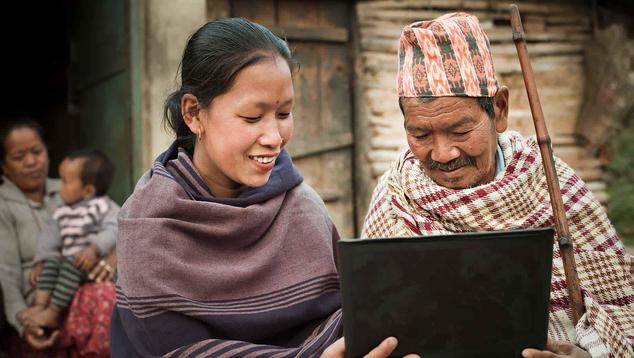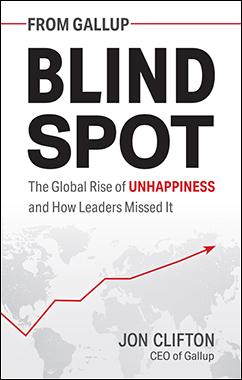Story Highlights
- Globally, accurate and timely public data are hard to come by
- Purpose-driven private organizations are filling global data gaps
- Hologic and Cookpad illustrate how to make a difference on a global scale
The following is an excerpt from Blind Spot, Gallup's new book about the rising unhappiness leaders didn't see. For more insights like this, order your copy of Blind Spot today.
Chapter Twenty: What Public Sector and Private Sector Leaders Can Do Together
I'm afraid there are no more than 1.5 million [people] in the country, but I can't prove it. -- Apostol Simovski, State Statistical Office Director, North Macedonia, 2020
In 2020, the North Macedonian government officially reported that the country's population was slightly over 2 million; yet according to the director of the country's statistics office, it was only 1.5 million. Some economists thought the population might be 1.6 million or 1.8 million.
But no one really knew how many people lived in North Macedonia. And the reason no one knew was because North Macedonia had not conducted a census since 2002.1
It seems comical that a leader would not know how many people live in their country, but it's not funny. And not having even the most basic statistics is a reality in far too many places. According to the U.N.'s 2019 sustainable development goals report:
Many national statistical systems across the globe face serious challenges … As a result, accurate and timely information about critical aspects of people's lives is unknown. Numerous groups and individuals remain "invisible," and many development challenges are still poorly understood.
If we are going to improve people's lives, the world needs better data everywhere. But too many governments simply cannot afford to produce the statistics necessary for leaders to create informed policy.
According to the same SDG report, only 129 countries in 2018 had implemented a national statistics plan. And of the 129 countries with a plan, only 60% were fully funded. Another study by the World Bank found that while 119 middle- to lower-income countries met the minimum standards to conduct a census, only 41 met the minimum standards to collect vital registration data such as births and deaths.
If we are going to improve people's lives, the world needs better data everywhere.
And the pandemic only exacerbated the world's data collection problems. According to the World Bank in 2020, 65% of National Statistics Offices (NSOs) were partially or fully closed, and 96% had stopped face-to-face data collection. It also said that 90% of NSOs in low- and lower-middle-income countries were "struggling to meet international reporting requirements."
These data collection gaps need to be addressed. If governments cannot address them, then the private sector could -- and here's how.
A Company's Purpose and Helping Build the World's Official Statistics for Everything
Most companies articulate what kind of unique value they bring to the world through their mission or purpose statement. As an example, here is what Whole Foods Market says on its website:
Our purpose is to nourish people and the planet. We're a purpose-driven company that aims to set the standards of excellence for food retailers. Quality is a state of mind at Whole Foods Market.
Nourishing people and the planet is a laudable mission, but what indicators does Whole Foods use to track the nourishment it provides the world?
The world does not have reliable statistics for how well people are nourished. Whole Foods could fix this problem by announcing that it is going to help build the world's official statistics for global nourishment (also known as diet quality). This would not only further demonstrate Whole Foods' commitment to nourishing the planet, it would significantly help the public sector, which badly needs these data.
Two companies are already leading the way in helping produce global statistics that also reflect their companies' missions: Cookpad and Hologic.
Cookpad and the World's Official Statistics for Cooking
Cookpad is a famous Japanese company -- so famous that almost half of Japanese adults use its cooking app. The business is a lot like Instagram, except for cooking. When you make a dish, you post a photo of that dish on Cookpad's app and then describe how you made it. People can then re-create your dish and share their own photos and comments.
So what is the purpose of this company? If you had asked Milton Friedman, he would have said "to make money." If you ask Cookpad President and CEO Rimpei Iwata, he says something very different. In 2019, I sat with Rimpei at Cookpad's global headquarters in Tokyo.
"Our goal is to get more people cooking at home. We believe that if they do, they will become more aware of what they are cooking and eating, which will have a positive impact on individual health and also the health of the planet. There's also a wider impact on society as a whole," he told me.
The company's website further articulates its mission: "We believe that cooking is the key to a happier and healthier life for people, communities and the planet."
Cookpad's purpose is clear: Increase home cooking because it will increase people's -- and the world's -- wellbeing. But how does Cookpad know if its purpose is working? And how does it know if people are cooking more globally?
To quantify these things, Cookpad built the world's official statistics for cooking. Now, in almost every country, every year, Cookpad and Gallup partner to ask people how often they are cooking at home. More specifically, we ask people how often they made lunch and dinner in the past week. Because the official statistics for cooking are on the same survey as the happiness items in the World Happiness Report, we can also look at the data to see if cooking is helping make people's lives better.
If Cookpad realizes its purpose, more people will be cooking at home everywhere, which should also improve people's wellbeing.
Hologic and the Global Women's Health Index
With 7,000 employees and a market cap of $20 billion, Massachusetts-based Hologic is a medical device company focused on women's health. But what is its purpose?
According to Hologic, it is "an innovative medical technology company primarily focused on improving women's health and wellbeing through early detection and treatment."
Hologic exists to improve women's health. To better serve that mission, the company wanted to quantify how women's health was faring globally. According to Hologic's CEO Steve MacMillan, "In our ongoing work to support women's health around the world, we've struggled to find comprehensive data that measures progress on key issues like access and quality of care on a global scale."
Instead of sitting back and saying, "The data don't exist for us to really determine how much of an impact we are making in the world," Hologic went out and did something about it. On International Women's Day in 2021, MacMillan said, "Beginning in 2019, we started working to develop the Global Women's Health Index to fill this critical need for a data-driven approach to women's health."
In Hologic's 2021 sustainability report, MacMillan further said:
For all the products we've made over our Company's lifetime -- 3D mammography, the PAP test and HPV test -- the data we get from the Hologic Global Women's Health Index may turn out to have the biggest impact on human health of anything we have ever done. Having been at the forefront of so many innovations in women's health, we thought who better to organize and conduct a global effort to obtain answers in our space of healthcare.
In partnership with Johns Hopkins University, George Washington University, RAD-AID, and Popper and Co., among others, Hologic and Gallup built an index to track how women's health is progressing globally.
The results of the 2020 Hologic Global Women's Health Index were sobering -- there was not a single country that received a passing grade in women's health. The report ignited a conversation: More needs to be done to improve women's health everywhere.
But imagine if every large company built international statistics like Cookpad and Hologic did. Leaders who believe that their organization has a purpose beyond making money should put that purpose in writing and then help build the world's official statistics around whatever that purpose is. These statistics would not only help them better understand if they are achieving their company's purpose, the resulting data would also help inform public sector leaders who badly need this information.





